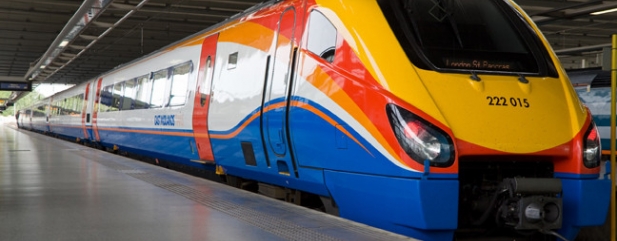Archived article
Please note that tax, investment, pension and ISA rules can change and the information and any views contained in this article may now be inaccurate.
How do train operators turn a profit?

Every day millions of us struggle with the constant grind of commuting, facing delays ranging from signal problems to more anarchic excuses like swans running loose on the tracks.
While experiencing these hold-ups, do you ever stop to think about how transport companies turn a profit? In this article we
look at the main operators which are listed on the UK stock market and which names are best and worst placed.
Why are rail franchises important?
Most train companies in Britain operate under a franchise lasting on average seven years, which has been the case since the mid-1990s and the privatisation of the rail network.
Britain’s franchising model has been criticised as ‘no longer fit for purpose’ in some quarters for its failure to deliver consistent performance and affordable fares.
According to analysts, the most important factor for operators is passenger revenue, which is driven by the volume of people using their services.
Companies aim to keep existing franchises or win additional ones to boost the number of passengers and revenue.
They ‘bid’ to take control of a franchise and submit evidence of a reliable track record. When a franchise is two years from completion, the UK Government issues an ‘invitation to tender’ to generate competitive bids.
While price is important, there is a growing emphasis on the delivery of services following recent failures on the West Coast franchise. Falling short of performance targets can lead to financial penalties.
When considering a franchise, the Government knows what it wants the new business to achieve. Potential bidders have to work out what they can deliver, how to meet these objectives, and whether they can provide extra benefits.
If the bidder wins the franchise, they have to deliver premia payments to the Government every year. The franchise is at risk if they do not pay. In 2009, for example, National Express (NEX) defaulted on the East Coast franchise due to the economic downturn and rising fuel prices.
Depending on the company, the state sometimes shares the revenue risks. South West Trains receives a proportion of the shortfall if actual revenue falls short of the anticipated revenue included in the bid from operator Stagecoach (SGC).
What about compensation payments?
Over the last few years, price hikes and compensation issues have been thrust into the spotlight.
An increase in regulated rail fares is determined based on the retail price index. This covers approximately half of all tickets. The remaining half is unregulated.
Money from operators is paid to delayed passengers, assuming they make a claim. Infrastructure operator Network Rail compensates train operators for unscheduled delays if its infrastructure is responsible, to offset the impact of poor performance.
In its 2015/2016 financial year Network Rail paid out around £106m, with Govia Thameslink Railway (GTR) receiving the most at £22.4m and Southeastern getting £18.2m.
What are the main sources of profit for rail companies?
Go-Ahead (GOG)
Go-Ahead operates Southeastern, London Midland and Govia Thameslink Railway (GTR), which is responsible for Southern; 74% of its revenue comes from the rail operations.
Over the last year, Southern has suffered strikes following a row over driver-only trains, which could hit Go-Ahead’s profits by up to £15m.

The Government is considering taking direct control of the rail franchise for Southern as it is responsible for a proportion of the revenue risk for GTR and is therefore directly affected by the dispute.
According to analysts, the Government chose to help due to the uncertain impact on passenger numbers during the reconstruction of London Bridge station and knock-on effect to services.
Go-Ahead is also at risk if the Government does not agree to force majeure provisions that would render the strikes ‘financially neutral’.
Broker Investec analyst Alex Paterson has cut operating profit expectations for Go-Ahead from £161.2m to £152.9m for the full year 2017.
FirstGroup (FGP)
FirstGroup operates Great Western Railway (GWR) and TransPennine Express.
Its rail division is expected to deliver lower operating profit, falling from £72.9m to £42.6m in 2017. FirstGroup recently attracted more rail passengers, but network upgrade work took its toll on GWR.
Liberum transport analyst Gerald Khoo believes FirstGroup is making good progress with the turnaround in its North American bus division with a potential return of dividends in the future.
National Express (NEX)
Earlier this year, National Express sold its only franchise C2C to Italian firm Trenitalia for £72.6m. So at the moment it doesn’t have a train franchise in the UK.
Stagecoach (SGC)
At Stagecoach, 55% of its revenue is generated through its rail division, which includes South West, East Midland and Virgin Trains.
In its half-year results in December 2016, the group admitted revenue at Virgin Trains East Coast is failing to reach its original target for the franchise.
Who should I consider investing in?
If FirstGroup can mitigate the impact of network upgrade work on GWR and continue to strengthen its current operations, its shares could represent an attractive opportunity for investors. It currently trades at 11.7 times prospective earnings per share.
Who should I avoid?
Alongside half-year results last year, Stagecoach warned of declining profitability in its South West Trains and Virgins Trains East Coast franchises. Management says passenger revenue growth is insufficient to cover increased premia payments to the Government and higher operating costs.
Liberum’s Khoo highlights that Stagecoach’s risk is concentrated on this franchise and it faces renewal risks. This is reflected in a forward price-to-earnings ratio of just 7.4 times.
Go-Ahead is one to avoid until industrial action at Southern is resolved as that is hurting profitability and rendering the outlook uncertain.
Important information:
These articles are provided by Shares magazine which is published by AJ Bell Media, a part of AJ Bell. Shares is not written by AJ Bell.
Shares is provided for your general information and use and is not a personal recommendation to invest. It is not intended to be relied upon by you in making or not making any investment decisions. The investments referred to in these articles will not be suitable for all investors. If in doubt please seek appropriate independent financial advice.
Investors acting on the information in these articles do so at their own risk and AJ Bell Media and its staff do not accept liability for losses suffered by investors as a result of their investment decisions.
Issue contents
Big News
- 888 comes up trumps
- Argos saves the day for Sainsbury’s
- The fund which can help you beat inflation
- Setting the course for Brexit
- Has Royal Mail delivered for investors?
- Investor makes £2bn move on Anglo
- Watch NHS risk with Medica
- AstraZeneca to take a dose of Circassia
- Cheap mortgages could free up cash for investing
Editor's View
Great Ideas Update
Investment Trusts
Larger Companies
Main Feature
Smaller Companies
Story In Numbers
- 1.01%: BEST RATE FOR CASH ISA
- UK Media Companies
- FTSE 100 Stocks - Best Performing
- 2.1%: House price growth in East Midlands in top form
- $23 billion: Behemoth created by Vodafone India merger
- Hansteen disposal worth more than its market cap
- 15%: Rights issue might not solve Tullow’s debt problem
- 22%: Recruiter enjoys strong growth in Asia

 magazine
magazine









